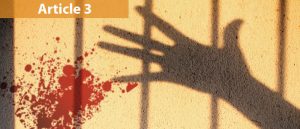The European Court of Human Rights (ECtHR) in its decision dated 4 April 2017[1], slammed the Cypriot government for violating certain aspects of article 3 of the European Convention on Human Rights (ECHR), which prohibits torture and inhumane treatment. The decision relates to an application made by Mr David William Thuo, a Kenyan migrant, against Cyprus on the basis of alleged police brutality and inhumane treatment in 2005, while Mr Thuo was in the process of being deported from Cyprus. [2]
In its decision the ECtHR condemned the ineffective response of the Cypriot authorities (the Ombudsman, the Independent Authority for the Investigation of Allegations and Complaints Against the Police – “IAIACAP”, and the Attorney General) in relation to their investigation into Mr Thuo’s complaints. The ECtHR’s decision also found against the Cypriot government in relation to Mr Thuo’s conditions of detention while he was held in Block 10 of the Central Prison.
In the same decision the ECtHR did not uphold Mr Thuo’s complaint with regards to alleged ill-treatment during the deportation process, mainly due to insufficient supporting evidence, which itself was due to the Cypriot authorities’ failure to conduct an effective investigation into his complaints. The ECtHR stated that (par.148):
Having regard to the parties’ submissions and all the material in its possession, the Court considers that the evidence before it does not enable it to find beyond all reasonable doubt that the applicant was subjected to treatment contrary to Article 3, as alleged. It particularly emphasises on that point that its inability to reach a conclusion as to whether there has been treatment prohibited by Article 3 is to a considerable extent due to the domestic authorities’ failure effectively to investigate the applicant’s complaint.
According to the judgment, the Court’s position (above) that the authorities had failed to carry out an effective investigation was based on the below findings:
It took the Ombudperson and the IAIACAP an entire year to begin investigating Mr Thuo’s complaint. When statements were finally taken from the police officers involved, three years had passed since the events complained of. The investigators noted that the officers in question had omitted facts, been dishonest and had failed to record what happened during the deportation process. They also noted that two of the five officers involved had refused to co-operate with the investigation, and one claimed not to recall anything. Nevertheless, the investigator accepted their version of events, without making any attempt to investigate the discrepancies or omissions in the officers’ statements. As mentioned in the judgment, Mr Thuo’s account of the events, which had been consistent throughout the investigation, was ignored completely. The IAIACAP and Attorney General blindly adopted the same approach, and no charges or disciplinary proceedings were brought against the officers.
Furthermore, the judgment notes that the authorities appeared to have been biased against Mr Thuo from the moment the complaint was filed, viewing him as “a self-serving person who had ulterior motives in making his complaint”.
Apart from the violation of article 3 by the Cypriot government and the authorities’ failure to conduct an effective investigation into Mr Thuo’s complaints, KISA also condemns the attempts which were made to prevent any public debate around these violations. Finally, we would like to draw the attention of the mainstream media to the fact that, without properly looking into the ECtHR’s findings, they simply reproduced news stories of the Cypriot government’s alleged “vindication” by the ECtHR.
[1] The decision can be found at: https://goo.gl/o6j9c7
[2] Mr Thuo appealed to the ECtHR in 2009 alleging a violation of his rights under article 3 ECHR, stating that he had been abused by the police, first during his detention in Block 10 of the Central Prison and subsequently during the deportation process, while at Larnaca Airport and on board the flight to Milan (the first part of the journey to Kenya). In his evidence presented to the ECtHR, Mr Thuo said that police in the Central Prison used racist insults against him, beat him and denied him his constitutional right to communicate with his lawyer. Furthermore, he stated that once he had been taken to the airport he was placed in handcuffs and three police officers forced papers into his mouth, and covered his head with bandages, before placing him on board the plane.





